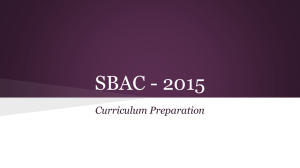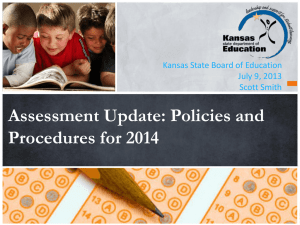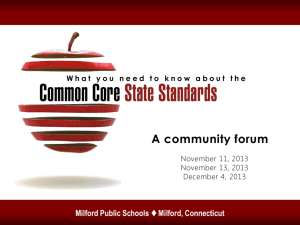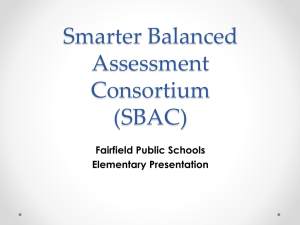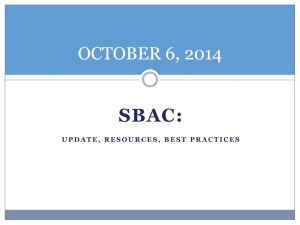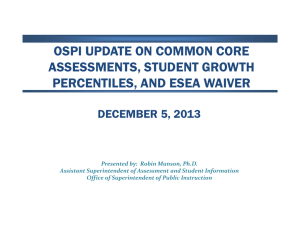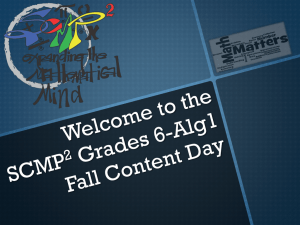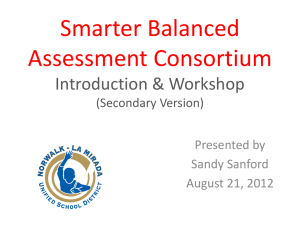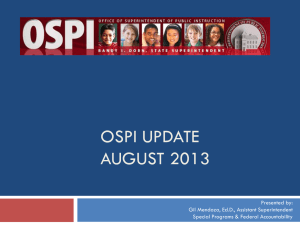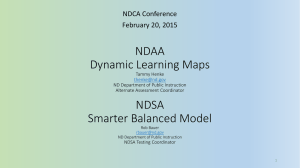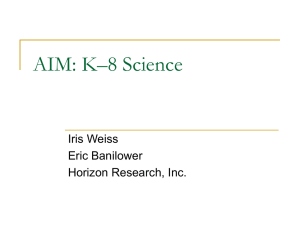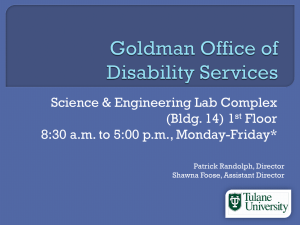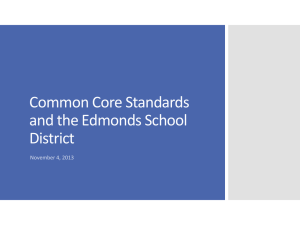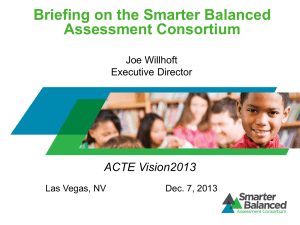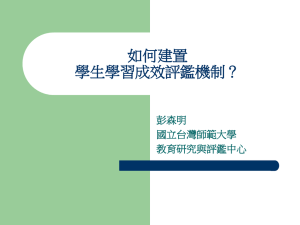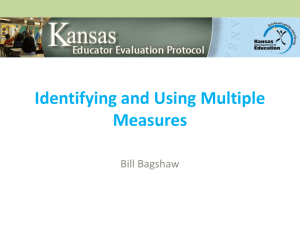NH SBAC Presentation - Curriculum-Instruction
advertisement
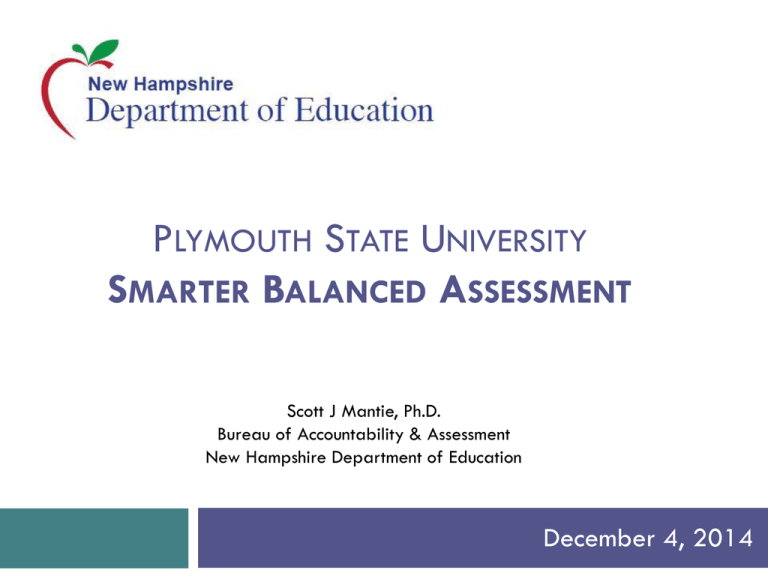
PLYMOUTH STATE UNIVERSITY SMARTER BALANCED ASSESSMENT Scott J Mantie, Ph.D. Bureau of Accountability & Assessment New Hampshire Department of Education December 4, 2014 The Context and Perspective Why do we assess? For many reasons, but the most important are: 1. Improve teaching and learning 2. Evaluate and improve programs 3. Support accountability uses In serving all three of these purposes, assessments should reflect intended learning targets, but can also serve as an important signal to what should be learned Assessing for Deep Understanding We want students to develop deep understanding of important knowledge and skills and know if/how students are acquiring those skills/knowledge. A major component of Next Generation Learning is the ability to solve novel problems—this requires deep understanding! Assessment conveys what’s important to learn (a signal) as well as providing an opportunity to check on students’ understanding and evaluate achievement Previous Assessment Status With other, earlier assessments… “The Remediation Gap” High School was here… College/Career was here… Next-Generation Assessment Needs Rigorous assessments of progress toward “college and career readiness” Common cut scores across all Consortium states Information about grade-level achievement and growth Valid, reliable, and fair for all students (students with “significant cognitive disabilities" will be assessed using another valid, reliable and fair assessment) Administered online, using multiple measures (interim) How we got here… SBAC Underlying Principles: SBAC learning and assessment system grounded in: Theory of Action Research-supported instructional practice (blueprints) Technology-supported tools Innovative assessments State-of-the-art classroom support mechanisms Have the broadest access for the greatest number of students How we got here… SBAC is Based on Research: Demonstrating evidence – does the assessment collects the information desired? This is an ongoing process Using Educational-Assessment Best Practices & Materials: Standards for Educational and Psychological Testing (AERA, 1999) U.S. Department of Education’s Standards and Assessment Peer Review Guidance (2009b) Program Evaluation Standards (Yarbrough, Shulha, Hopson & Caruthers, 2011) Guiding Principles for Evaluators (American Evaluation Association, 2004) Evidence-based to determine what can be done to improve learning – this evolves operationally How we got here… SBAC is both Reliable & Valid It was essential to have comprehensive and detailed evidence to support the validity and reliability of SBAC assessment. Test development process seeks to make explicit the claims that test users can make when interpreting student scores. Detailed & Rigorous Framework Constant Test Development & Test Evaluation processes Adaptive Assessment Adjusts to student’s ability by basing difficulty of future questions on previous answers More accurate measurement of student achievement – particularly for high and low performing students Creates an individually tailored set of questions Tested (mathematically) in the Field-Test CAT implemented 2001, Supporting Research: A Framework for the Development of Computerized Adaptive Tests, Nathan A. Thompson, Assessment Systems Corporation, and David J. Weiss, University of Minnesota The Road Ahead for State Assessments, Rennie Center for Education Research & Policy, Policy Analysis for California Education (PACE) Here is how the Smarter Balanced system fits into the school year Summative Assessments Performance Tasks Optional interim assessments Optional interim assessments Scope, sequence and timing of interim assessments locally determined Computer-adaptive accurate, aligned to Common Core and built to promote great instruction Computer Adaptive Assessment Student results Fast, detailed and digital with year-on-year measurement. Teacher Development / NH Networks (Formative) Instruction School year 10 Assessments in New Hampshire Assessment in New Hampshire SBAC: state assessment for mathematics and English language arts NECAP Science: state assessment for science NH ALPs Science: alternate assessment for science ELA/Math Alternate Assessment: DLM (Dynamic Learning Maps) Schools piloting 11th grade SAT: USED – no approval yet Data Privacy: NO student identifiable information collected! NH Privacy & Security of Student Data FAQs\faq_privacy.pdf NO non-academic questions are asked! On-line, Adaptive Assessment vs. Paper/Pencil We want to take advantage of the engaging aspects that adaptive, on-line tests can have for students Emphasis: Removing the test as being the focus of the assessment Online vs. Paper/Pencil • Adaptive (online) adjusts to student vs. non-adaptive (p/p) fixed • Online – greater security (p/p lost/misplaced paper, changes numerous hands, etc.) • Online – faster results (p/p must wait until all test results are in) • Online – Performance Tasks (p/p no performance tasks) • Online – more usability, accessibility and accommodations (p/p fewer) • Language supports (glossaries in 10 languages & dialects, full Spanish translations of math assessment) • Deaf or hard of hearing receive tests in American Sign Language, signed by recorded human interpreters • Refreshable Braille keyboards and real-time embossers allow blind students to receive online tests in Braille • Accommodations uploaded (IEP & 504) Online – will assess a broader range of students because of the many adaptive and accessibility features NH Assessment: Important Points SBAC Operational Vendor Selected In conjunction with NEAC States (CT & VT) Approval through G&C in December Training, documentation and portion of reporting Interim Assessments (2-12) & Digital Library ARE included Digital Library operational December, 2014 Transition plan from previous to new SBAC accommodations Practice & Training Tests, Scoring Guides, Documentation See: http://sbac.portal.airast.org/ Emphasis: Removing the test as being the focus of the assessment NH Assessment: Important Points, II SBAC Usability, Accessibility and Accommodations (UAA) NECAP to SBAC Crosswalk Draft completed (…last night) “Transitioning from current usability/accommodations to SBAC usability/accommodations” Planning document UAA Implementation Guide – baseline UAA “Frequently Asked Questions” – baseline Alt assessment (DLM) & SBAC score integration – vendor Alt Assessment Stakeholders meeting – SBAC or DLM decision tree (12/4/14 meeting date) UAA Documents\SmarterBalanced_Guidelines_091113[1].pdf UAA Documents\Smarter Balanced Usability Accessibility and Accommodations FAQs[1].pdf NH Assessment: Important Points, III SBAC Digital Library Rollout Week of 12/1/14: Send/acquire SBAC contact for each district Week of 12/8/14: Provide access to SBAC Digital Library to district contacts and direct them to SBAC-provided Digital Library manuals/information Week of 12/15/14: Provide documentation/information to district SBAC district contacts related to how to sign-up SBAC Digital Library users (i.e. educators/teachers) https://www.smarterbalancedlibrary.org/digital-library-resources https://www.smarterbalancedlibrary.org/digital-library-resources NH SBAC Testing Window Window can begin: 66% instructional days: Grades 3-8 80% instructional days: Grade 11 Where other States are at regarding 12 Week Test Window: Variable Testing Window for NH: Grades 3&4, weeks 1-6 Grades 5&6, weeks 3-8 Grades 7,8,11, weeks 5-12 Makeups during same grade-band weeks Idea: Create a “testing schedule for your school? Smarter Balanced: Interim Details Interim to Provide valid, reliable and fair information about: May be used for K through 12 grade levels (aligned to CCSS 3-8 & 11) Student progress toward mastery of skills measured by summative assessment Performance at content cluster level so teachers and administrators can track student progress throughout the year and adjust instruction accordingly Individual/group (e.g., school/district) performance at the claim level to determine whether teaching and learning are on target Teacher-moderated scoring of performance events as a professional development vehicle to enhance teacher capacity to evaluate student work aligned to standards Student progress toward the mastery of skills across all students and subgroups of students Smarter Balanced: Digital Library Details Digital Library (AKA: Formative Assessment Resources) to Provide measurement tools and resources to: Improving teaching and learning Monitor student progress throughout the school year Help teachers and other educators align instruction, curricula and assessment Help teachers and other educators use the Summative, Performance and Interim assessments to improve instruction at the individual and classroom levels Illustrate how teachers and other educators can use assessment data to engage students in monitoring their own learning This will be made available to all NH teachers SBAC Checklist: Logical, best-practices design…? Asking non-academic questions…? Student privacy…? Validity & Reliability of assessment…? Accessibility to more students…? Timeliness of scores…? The Test: What We’ve Learned Access SBAC Practice & Training Tests: GOTO: http://sbac.portal.airast.org/ http://sbac.portal.airast.org/ THEN, GOTO: “Resources & Documentation” “Practice and Training Test User Guide” “Classroom Activity Administration Guidelines” “Scoring Guides” “Performance Task Writing Rubrics” OR… GOTO: “Student Interface Practice and Training Tests” Problem??? : Older technology or software (like my State computer…) “Download Secure Browser” PRACTICE/TRAIN USING THE PRACTICE/TRAINING TESTS! The Test: What We’ve Learned, II One district’s plan… High Leverage Strategies 1. Develop student stamina to persevere when presented with reading, writing and problem-solving 2. Teach skills of synthesis with multiple sources (short stories, books, poems, online articles, Scholastic News articles, etc.) 3. Regular practice on technology devices (Netbooks, laptops, etc.) in order to explicitly teach typing and technology manipulation skills 4. Teach students how to effectively respond to DOK 3 and 4 questions with DOK 3 and 4 answers 5. Increase opportunities for students to improve typing skills Communication Planning – Assessment Transition Stakeholder Advisory Group Assisting with the development of a communications plan around standards, competencies and assessments Preparing communication resource documents FAQs; talking points; parent resources Organizing and redesigning public information on the NH DOE website Collecting and redesigning educator resources on the NH Network Visit: SmarterBalanced.org for current information 23 For more information… 603-271-3844 Please contact Dr. Scott Mantie if you have any questions! Scott.Mantie@doe.nh.gov 603-271-3844 Information & Practice/Training Test Resources: http://sbac.portal.airast.org/
